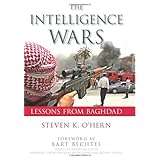
Average Reviews:

(More customer reviews)Are you looking to buy Intelligence Wars: Lessons from Baghdad? Here is the right place to find the great deals. we can offer discounts of up to 90% on Intelligence Wars: Lessons from Baghdad. Check out the link below:
>> Click Here to See Compare Prices and Get the Best Offers
Intelligence Wars: Lessons from Baghdad ReviewAsymmetric warfare is the term used to describe any war in which the weaker side chooses to avoid set piece battles and conventional tactics in favor of guerilla tactics usually supported by terrorism. Counter-insurgency operations (COIN) and counter-terrorism (CT) are both responses to these tactics. It has been widely argued that the key to successful COIN and CT operations is effective tactical intelligence. This book supports this argument and provides an unprecedented account of how effective law enforcement training and techniques can be used against both. Its author spent 2005 in Iraq as director of something called the "Strategic Counter- Intelligence Directorate" (SCID) which in spite of its title was charged with developing intelligence in support of military COIN. The SCID was composed of military and civilian investigators and analysts from the Navy, Air Force and Army criminal investigation organizations. In describing the operations of the SCID, O'Hern implies that law enforcement methodology including use of informants, operational intelligence, and basic investigative techniques can be very effective against insurgents and by extrapolation terrorists. He has two issues that he presses with particular passion: the need for more effective Human Intelligence (HUMINT) in Iraq; and the increasing influence of Iran on Iraq's Shia majority.The good news is that after this book was written the U.S. Army actually developed effective counter-insurgency techniques that incorporated more effective tactical intelligence. The bad news is that it took them almost four years to do this and the blundering and waste in the U.S. Intelligence System that O'Hern records remains uncorrected.
Intelligence Wars: Lessons from Baghdad OverviewSince the first heady months of the war in Iraq when President Bush celebrated aboard the USS Abraham Lincoln under a "mission accomplished" sign, US forces have been bogged down in a frustrating war of attrition against a largely unseen insurgency that attacks with ambushes and roadside bombs. In this revealing insider's look at the US intelligence community's efforts to fight the insurgency, author Steven K. O'Hern, who served in Iraq in 2005 as a senior intelligence officer, offers a critical assessment of our intelligence failures and suggests ways of improving our ability to fight an often elusive enemy. O'Hern criticizes America's military leaders for being enamored with high-technology solutions for all situations, including intelligence operations. Essentially, we are still relying on an intelligence system that was designed to beat the Soviet army. But with no troop formations or supply depots to spot by satellite and no radio signals to intercept, insurgent tactics significantly reduce the US military's technological advantage. Using examples from human source operations conducted in Iraq, this book explains why human intelligence--not technology--is the key to defeating an insurgency and why the US is so poor at using what the military calls "HUMINT." O'Hern also cites internal structural problems that work against effective intelligence operations. The "intelligence community" is actually a collection of organizations usually more interested in protecting turf than sharing information. The author gives examples of missed opportunities that resulted from information being caught in "stovepipes" and red tape. He shows how front-line units and intelligence officers developed ways to work around the intelligence bureaucracy in order to succeed. Due to these problems and others, O'Hern notes that US intelligence has failed to spot emerging threats, such as Iran's involvement in Iraq. In conclusion, he cautions that these unresolved problems will continue to affect the United States in any future conflict against an insurgency.
Want to learn more information about Intelligence Wars: Lessons from Baghdad?
>> Click Here to See All Customer Reviews & Ratings Now
0 comments:
Post a Comment